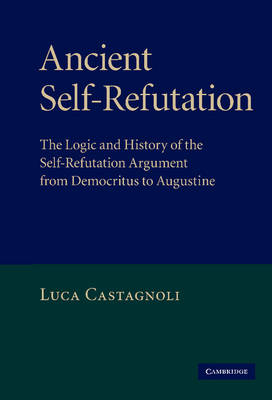
Ancient Self-Refutation
Cambridge University Press (Verlag)
978-0-521-89631-3 (ISBN)
A 'self-refutation argument' is any argument which aims at showing that (and how) a certain thesis is self-refuting. This study was the first book-length treatment of ancient self-refutation and provides a unified account of what is distinctive in the ancient approach to the self-refutation argument, on the basis of close philological, logical and historical analysis of a variety of sources. It examines the logic, force and prospects of this original style of argumentation within the context of ancient philosophical debates, dispelling various misconceptions concerning its nature and purpose and elucidating some important differences which exist both within the ancient approach to self-refutation and between that approach, as a whole, and some modern counterparts of it. In providing a comprehensive account of ancient self-refutation, the book advances our understanding of influential and debated texts and arguments from philosophers like Democritus, Plato, Aristotle, Epicurus, the Stoics, the Academic sceptics, the Pyrrhonists and Augustine.
Luca Castagnoli is Lecturer in Ancient Philosophy at the University of Durham. He is the author of several articles on a variety of themes in ancient philosophy.
Introduction; Part I. Truth, Falsehood and Self-Refutation: 1. Preliminaries; 2. A modern approach: Mackie on the absolute self-refutation of 'nothing is true'; 3. Setting the ancient stage: Dissoi Logoi 4.6; 4. Self-refutation and dialectic: Plato; 5. Speaking to Antiphasis: Aristotle; 6. Introducing peritroph: Sextus Empiricus; 7. Augustine's turn; 8. Interim conclusions; Part II. Pragmatic, Ad Hominem and Operational Self-Refutation: 9. Epicurus against the determinist: blame and reversal; 10. Anti-sceptical dilemmas: pragmatic or ad hominem self-refutations?; 11. Must we philosophise? Aristotle's protreptic argument; 12. Augustine's 'Si fallor, sum': how to prove one's existence by Consequentia Mirabilis; 13. A step back: operational self-refutations in Plato; Part III. Scepticism and Self-Refutation: 14. Self-bracketing Pyrrhonism: Sextus Empiricus; 15. Scepticism and self-refutation: looking backwards; Conclusion.
| Zusatzinfo | 4 Halftones, unspecified |
|---|---|
| Verlagsort | Cambridge |
| Sprache | englisch |
| Maße | 158 x 235 mm |
| Gewicht | 800 g |
| Themenwelt | Geschichte ► Allgemeine Geschichte ► Vor- und Frühgeschichte |
| Geisteswissenschaften ► Philosophie ► Logik | |
| Geisteswissenschaften ► Philosophie ► Philosophie Altertum / Antike | |
| ISBN-10 | 0-521-89631-2 / 0521896312 |
| ISBN-13 | 978-0-521-89631-3 / 9780521896313 |
| Zustand | Neuware |
| Haben Sie eine Frage zum Produkt? |
aus dem Bereich


